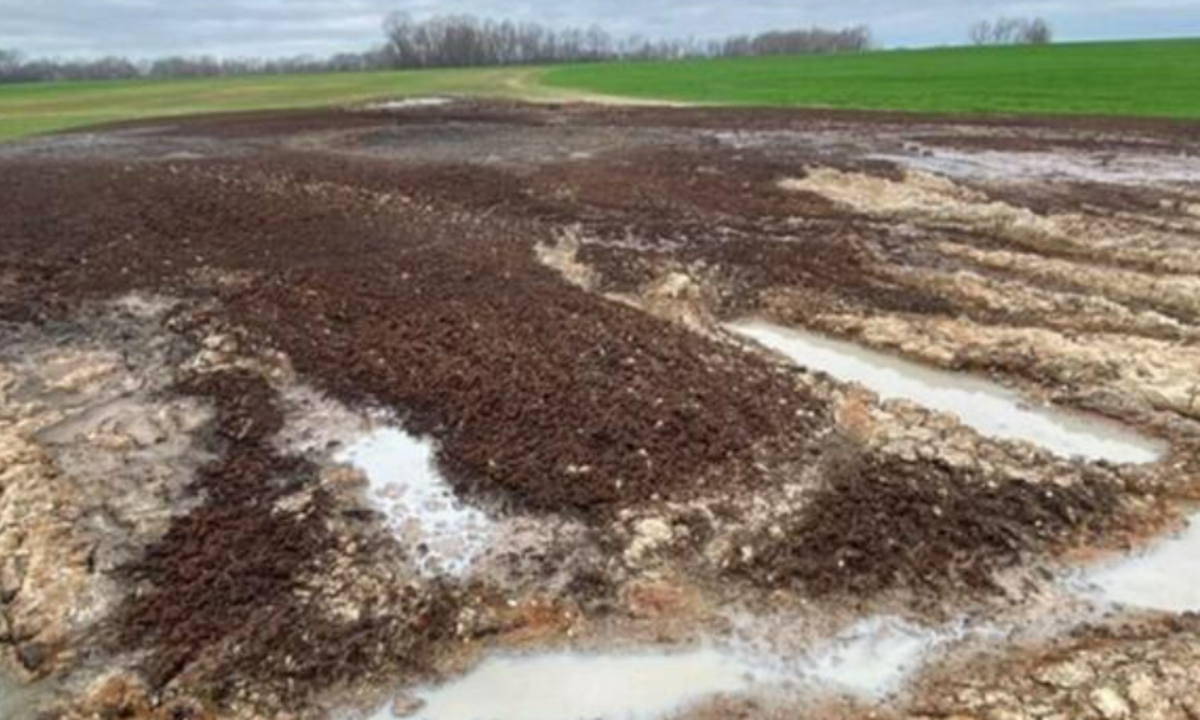Residents and officials in West Tennessee are raising concerns over the foul odor and environmental risks associated with the use of wastewater residuals as fertilizer.
The controversy centers around Denali Water Solutions, a company that collects and applies biosolids—solid waste from food processing plants—to farmland as an alternative to traditional fertilizers.
While the company claims the process is eco-friendly and cost-effective for farmers, local officials and residents say it has created unbearable stench, attracted vultures and rodents, and raised concerns about water contamination. Now, county officials are calling for stricter regulations or a moratorium on new permits to spread the material.
Unbearable Stench and Quality of Life Issues
In Haywood, Tipton, and Lauderdale counties, many residents say the stench from the biosolids is overwhelming. Some homeowners have reported:
Foul-smelling sludge runoff on public roads, coating streets in muck and dried residue.
Businesses temporarily closing due to the unbearable odor.
Vultures and rats flocking to sites where the material is applied.
Guests leaving homes early because of the smell.
Families considering moving to escape the ongoing issue.
Lauderdale County Mayor Maurice Gaines Jr. compared the smell to a rotting animal carcass, saying, “The only thing worse than this is a dead horse that’s been lying around for days.”
Haywood County farmer Macon Thornton said the situation worsened after Missouri banned the use of biosolids in 2024, leading to increased storage and application of the material in Tennessee.
“This may be a coincidence, but the same week Missouri stopped them from doing business, we had 12 more storage tanks appear on our farms,” Thornton said.
Environmental and Health Concerns
Apart from the noxious odor, officials and residents are worried about potential environmental and health hazards linked to the use of biosolids.
The Tennessee Department of Environment and Conservation (TDEC) requires Denali to test for nutrients and heavy metals, but residents argue that self-reported data is not reliable.
“Tennessee Department of Environment and Conservation isn’t running its own tests,” said Haywood County Mayor David Livingston. “We’re just supposed to trust the company?”
Another major issue is the lack of testing for PFAS (Per- and Polyfluoroalkyl Substances)—harmful chemicals commonly found in food packaging, water, and personal care products. PFAS are known as “forever chemicals” because they do not break down easily in the environment and have been linked to cancer, immune disorders, and birth defects.
A 2024 report by the Sierra Club found PFAS contamination in Tennessee’s soil and water near biosolid application sites. Officials fear that runoff from treated fields could be polluting water sources and harming wildlife.
Weak Regulations and Permit Violations
Despite concerns, TDEC continues to approve new permits for Denali. In November 2024, the department allowed the company to expand operations near the Hatchie National Wildlife Refuge, despite strong opposition from local leaders.
The permitting process has raised concerns, with officials saying that Denali frequently violates permit rules without facing consequences.
Under Tennessee law, biosolids must be:
Injected into the soil or incorporated within six hours after being spread.
Not applied on wet, snowy, or frozen ground.
Kept away from public roads and water sources.
However, residents have photographic evidence of Denali violating these rules, showing:
Sludge spread on snowy fields in January 2024.
Waste material sitting uncovered for weeks, creating a stronger stench.
Muddy roads coated in dried residue, despite rules prohibiting application near roadways.
“These companies know the regulations are weak, and they take full advantage,” said Thornton. “They get away with violating the rules because the penalties are too small to matter.”
Legal Action and Calls for Change
In August 2024, Lauderdale County sued Denali, demanding that the company stop storing and applying biosolids on a 280-acre site.
Denali agreed to halt operations in Tipton County earlier in the year after receiving permit violations, but within days, new waste storage tanks appeared in Lauderdale County.
“The problem is, they have not acted in good faith,” Mayor Gaines said. “They move from one county to another as soon as they’re told to leave.”
Now, officials from multiple Tennessee counties are pushing for legislative action to:
Require biosolids to be disposed of in the same county where they are produced.
Increase penalties for permit violations.
Mandate third-party environmental testing instead of relying on company-reported data.
Ban biosolid applications near water sources and protected wildlife areas.
“We may be a rural county, but we’re not a dumping ground for other states,” said Livingston.
Denali Defends Its Practices
Denali denies any wrongdoing and insists that its process is safe and beneficial for farmers.
“Our biosolids program helps farmers reduce fertilization costs while preventing landfill waste,” the company said in a statement.
Denali also claims it complies with all state and federal regulations and is “actively working with local officials” to address concerns.
However, many residents remain skeptical, arguing that Denali’s long history of permit violations in multiple states suggests otherwise.
What’s Next?
The controversy surrounding Denali Water Solutions is far from over. As officials push for legislative reforms, residents and environmental groups continue to demand stronger protections against the use of biosolids on Tennessee farmland.
Whether Tennessee will tighten its laws or allow business to continue as usual remains to be seen.
Disclaimer—Our team has checked this article to ensure its accuracy and eliminate any misinformation. We are committed to providing clear and reliable information for our readers.


